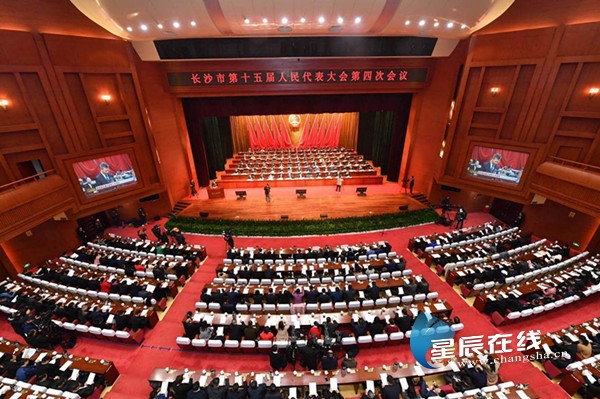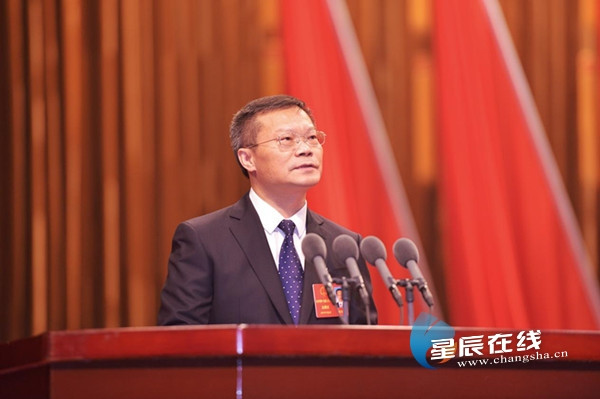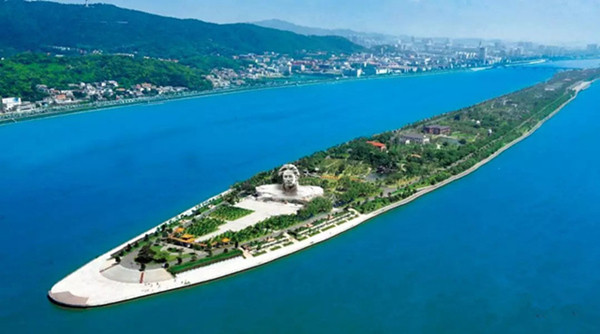2018: A fruitful year for Changsha


The fourth session of the 15th Changsha Municipal People's Congress opens in Changsha, capital of Hunan province, on Jan 8. [Photo/changsha.gov.cn]
The fourth session of the 15th Changsha Municipal People's Congress took place in Changsha, Central China's Hunan province on Jan 8, attended by a group of government officials, including Hu Henghua, Party chief of Changsha.

Hu Zhongxiong, mayor of Changsha, delivers the government work report of 2018 at the congress. [Photo/news.changsha.cn]
According to the latest government work report made by Hu Zhongxiong, mayor of Changsha, the city’s GDP increased by 8.5 percent in 2018, and the added value of industries above a designated size saw a growth of 7.6 percent. Its fixed-asset investment saw a year-on-year increase of 11.5 percent, while the growth rate of its total retail sales of consumer goods was 10 percent. (All the numbers are estimated according to the report.)
Over the past 40 years of reform and opening-up, Changsha has made steady progress in developing its local economy and improving the livelihoods of its residents. The city's GDP surpassed 1 trillion yuan ($147 billion) in 2018, along with another 16 cities expected to join the "1 trillion yuan club". Its construction land area expanded eight-fold with a new city pattern, making it one of the newly rising "first-tier" cities.
The city was ranked the happiest city in the country for the 11th consecutive year, according to Oriental Outlook magazine's annual survey published in late 2018. Achievements made by Changsha over the past year were obvious to all. The Blue Sky Protection campaign achieved initial success, and the qualities of air and drinking water were improved significantly. It has also put in place a "river and lake chief" system, in which selected local Party and government officials ensure their assigned rivers and lakes are protected from pollution, as well as a licensing mechanism for controlling pollutant discharge.

Orange Island, a popular tourism spot in Changsha, as seen under a blue sky. [Photo/icswb.com]
Measures have been taken to bring tangible benefits to residents covering food safety, housing, transportation and healthcare. For example, the city has carried out actions to enable the centralization of production and delivery of rice noodles and bean products, and greatly improve the dining environment with the goal of making Changsha a national demonstration city for food safety. In addition, more houses and roads were built and projects closely related to people’s daily lives have been promoted to upgrade the infrastructure of Changsha.
Changsha has introduced more favorable policies to local enterprises. A 100-day campaign, which deployed about 1,000 officials, was launched to help at least 1,000 companies solve their various issues. Smart manufacturing industries in Changsha have taken the lead in the country, and the number of national pilot demonstration enterprises in smart manufacturing totaled 27, ranking first among all provincial capitals in the country. Changsha, a new highland for inland opening up, was approved to be a national comprehensive pilot site for cross-border e-commerce by the State Council in July 2018, and its total volume of foreign trade increased 40 percent, the highest growth rate in capital cities in central China.
MOST POPULAR
Editors' Picks
 Infographic:
China's 5G subscriptions hit a new milestone
Infographic:
China's 5G subscriptions hit a new milestone
 Database:
China Economic Data Tracker
Database:
China Economic Data Tracker
 Infographic:
China extends visa-free transit to 240 hours
Infographic:
China extends visa-free transit to 240 hours




